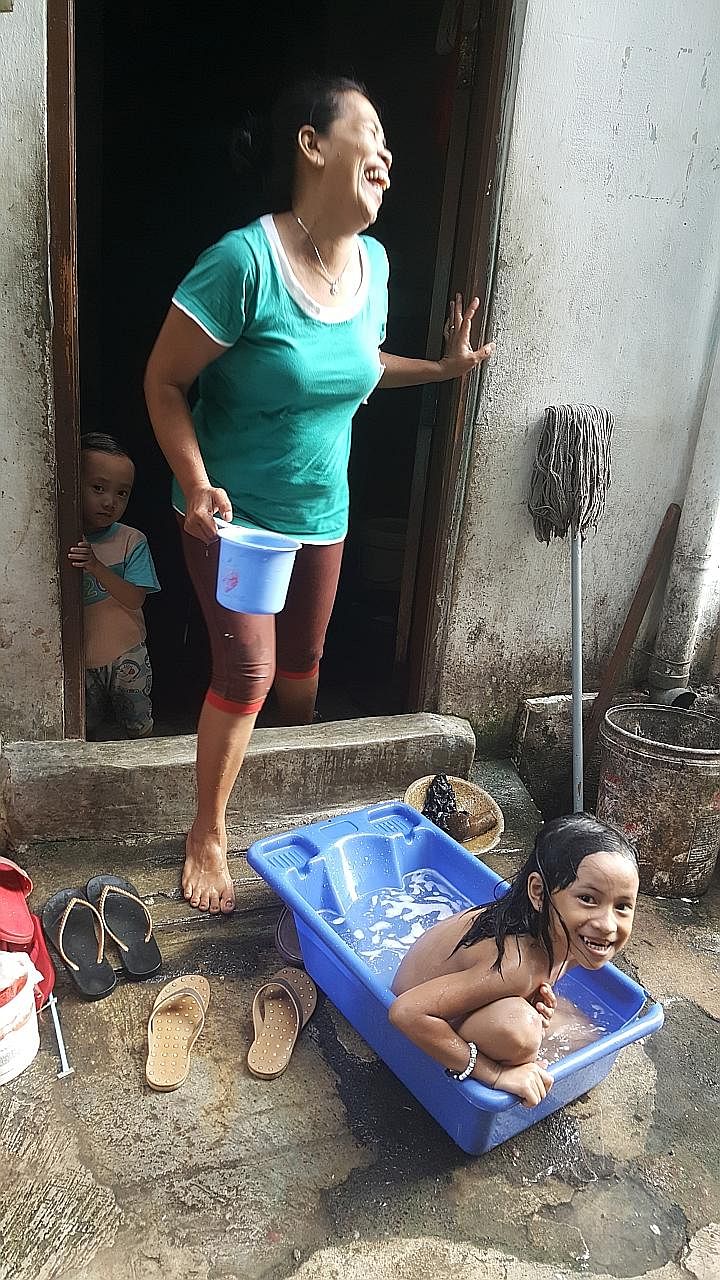Housewife Tatihar runs a household of 12, and her last task before turning in every night is to fill five buckets with clean water from a tap in her home in West Jakarta.
She does this because the water supply to her estate is cut off in the morning and sometimes resumes only late at night.
If she forgets to fill the buckets or cannot collect enough water due to low water supply, her family will have to bathe in public washrooms and buy bottled water to drink or cook the next day.

"It's 2016 and we are still dreaming of turning on the tap and getting clean water," said the 50-year-old when The Straits Times visited her estate in Kali Anyar last month.
Ms Tatihar, who goes by one name, is not alone in facing such issues with water despite living in a major city such as Jakarta.
Many still need to buy bottled water and lug it home for cooking, drinking and washing up.
People in rural communities face even bigger challenges, having to fetch unsafe water from the rivers or dig up wells to reach underground water sources. During the dry season, when wells become parched, they are often forced to buy water from suppliers who overcharge.
Water is not scarce in Indonesia, an archipelagic country boasting hundreds of rivers, streams and lakes, but official Central Statistics Agency (BPS) data from 2014 show that clean drinking water is accessible to only about 68 per cent of the population, while 61 per cent have access to basic sanitation.
Poor water management, inadequate infrastructure such as treatment facilities to filter and distribute clean water to homes, and rapid economic development which alters natural landscapes and contaminates water supply have led to scarcity in some parts of the country.
The government aims for universal access to sanitation and drinking water by 2019, but environmental observers are not too hopeful.
"Water is abundant here but the problem is how to facilitate access to clean water," said University of Indonesia environmental analyst Tarsoen Waryono. "The government has not optimised the use of reservoirs and dams to collect water and has not built enough water treatment plants."
Lien AID, a Singapore-based international non-profit organisation, has plans to implement sustainable water sanitation and hygiene solutions in the country.

Its chief executive, Mr Koh Lian Hock, said: "Lien AID is currently developing new programmes for Indonesia and we welcome interested partners to reach out to us."
Water security is not only an issue in Indonesia, but also in other developing South-east Asian countries. Their problems are similar: poor water quality due to household and industrial activities, water shortage brought about by seasonal droughts and climate change, limited funds, and lack of standards, regulations and water-management expertise.
Lien AID has installed more than 50 Community Water Enterprise programmes in Cambodia and southern Vietnam, benefiting more than 300,000 people. It builds water treatment and bottling plants within communities, which then own, operate and maintain them upon completion.
Ms Sopheak Sim, 34, a Community Water Enterprise assistant programme manager in Cambodia, told The Straits Times that some people in poor rural communities living in areas without clean water sources have to cycle 1km to 2km to other places to obtain water from wells and ponds. With the programme, residents can now get water more easily and buy at prices four to five times lower than what private suppliers charge.
"Those who live on the river in floating villages use the water to cook, wash and drink, and they also defaecate into the river," she added.
"Now they can get treated water near their homes or villages, and they can buy at a cheaper price."
